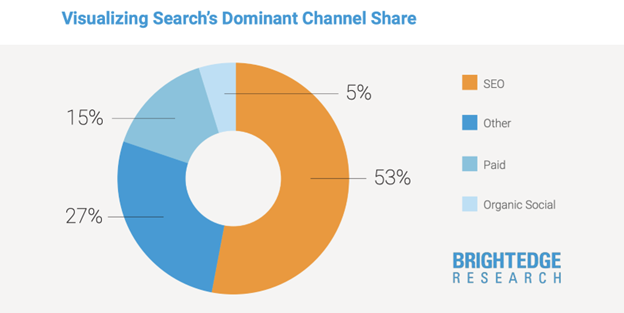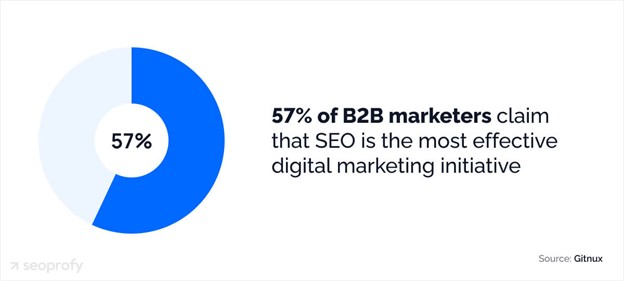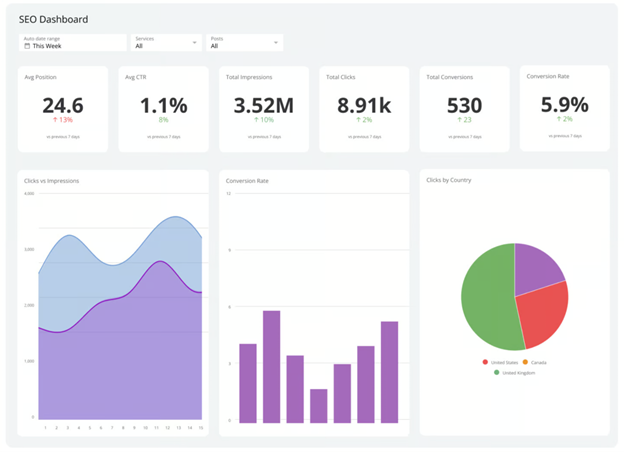
In a world where 93% of online experiences begin with a search engine, according to a recent study by BrightEdge, the importance of search engine optimization (SEO) is undeniable. Businesses today face an overwhelming amount of data, but how can they leverage it effectively to improve their SEO strategies and overall business operations? The answer lies in innovative approaches to data archiving, analysis, and customer engagement.
The Role of Data in SEO and Business Success
Data is the backbone of any successful business strategy, including SEO. Whether it’s tracking user behavior, identifying trends, or optimizing content, businesses that utilize their data effectively are better positioned to dominate search rankings and customer engagement. However, raw data alone isn’t enough—it needs to be structured, analyzed, and actionable.
Key Benefits of Data in Business:
- Enhanced decision-making: Access to comprehensive data helps businesses make informed decisions.
- Personalized customer experiences: Detailed insights allow for tailored marketing strategies.
- Competitive advantage: Businesses that understand their data are more agile and adaptable.
Data Archiving Solutions: A Foundation for Insights
Effective data management begins with robust archiving solutions. Archiving isn’t just about storing information; it’s about creating an organized system that allows easy access to historical data, which is crucial for long-term SEO strategies and business growth. Incorporating social media archiving tools into these systems can further enhance data collection and analysis, offering valuable insights into customer interactions and market trends.
Benefits of Modern Data Archiving:
- Historical SEO data analysis: Businesses can track the evolution of their rankings and identify successful strategies.
- Compliance and security: Cloud data archiving ensures that sensitive information is stored securely and meets regulatory standards.
- Improved scalability: As businesses grow, their data needs expand. Scalable archiving systems can handle this growth seamlessly.
For instance, companies can use cloud data archiving to preserve their SEO reports, ensuring they’re accessible for future reference. This not only helps track progress but also facilitates the identification of patterns and opportunities.
Surveys: The Untapped Resource for SEO Improvement
Customer feedback is an invaluable resource for businesses, yet it is often underutilized. Surveys can provide insights that drive both business improvements and SEO strategies.
Using Surveys to Enhance SEO:
- Identify customer pain points: Use survey responses to create content that addresses specific issues customers face.
- Gather keyword insights: Surveys can reveal the language and phrases customers use, which can inform keyword research.
- Measure satisfaction with digital experiences: Insights from surveys can guide UX improvements, which are crucial for SEO success.
Anonymous surveys, in particular, encourage more honest feedback, helping businesses gain deeper insights into customer behavior and preferences.
Leveraging Tools for Business and SEO Success
Modern businesses have access to a plethora of tools that can enhance their operations and SEO strategies. These tools not only streamline workflows but also provide actionable insights.
Essential Tools for Businesses:
- Social media archiving tools: These help businesses maintain a record of their social interactions, ensuring compliance and providing data for trend analysis.
- Analytics dashboards: Centralized platforms for tracking website performance and user behavior.
- Excel consultants: Professionals who can transform complex data into actionable insights through advanced spreadsheet techniques.
By integrating these tools into their operations, businesses can gain a holistic view of their performance and uncover opportunities for improvement.
SEO Reporting: Beyond the Basics
SEO reporting is often treated as a routine task, but it can be a powerful tool for strategy and innovation. Effective reporting goes beyond surface-level metrics to uncover deeper insights.
Components of an Effective SEO Report:
- Organic traffic trends: Identify patterns over time and correlate them with specific campaigns.
- Keyword performance: Track the effectiveness of targeted keywords and discover new opportunities.
- Backlink analysis: Understand the quality and impact of your backlink profile.
A dynamic approach to SEO reporting can reveal untapped potential and drive strategic decisions. Combining this with insights from surveys and analytics tools can lead to a more comprehensive understanding of business data.

Creative Uses of Business Data
Incorporating creativity into data usage can set businesses apart. Data isn’t just for analytics; it can also inspire innovative strategies.
Innovative Applications:
- Content ideation: Use data from surveys and analytics to identify trending topics and create relevant content.
- Customer segmentation: Leverage historical data to personalize outreach campaigns.
- Performance forecasting: Predict future trends based on past data, allowing for proactive adjustments.
These creative uses of data can drive both SEO success and overall business growth, ensuring a competitive edge in the market.
The Importance of Integrating Offline and Online Data
Many businesses focus solely on digital data, but offline data can be equally valuable. By combining online metrics with insights gathered from offline customer interactions, businesses can gain a more holistic understanding of their audience. For example, in-person surveys conducted at events can supplement digital data, offering a richer perspective on customer needs and preferences. This integration enhances decision-making and helps refine SEO strategies by bridging gaps between online and offline behaviors.
Real-Time Analytics for Agile SEO Strategies
Real-time data has become a game-changer in the world of SEO. Businesses that monitor their analytics in real time can adapt to market trends faster and seize opportunities as they arise. For instance, sudden changes in keyword performance or user engagement can prompt immediate adjustments to content strategies or ad campaigns. Real-time analytics, accessible through a web analytics dashboard, empower businesses to stay ahead of the competition by making data-driven decisions in the moment.

SEO dashboard example by Klipfolio
Building a Collaborative Data Culture
To maximize the potential of business data, fostering a culture of collaboration is essential. When teams across departments—such as marketing, sales, and IT—work together, they can share insights and align strategies. For instance, marketers can use SEO performance data to guide content creation, while sales teams can integrate feedback from customer interactions to identify emerging trends. Encouraging collaboration ensures that data-driven decisions are not siloed but instead contribute to unified business goals. Such a culture empowers organizations to make better use of their data and consistently refine their approaches to both SEO and broader business strategies.
Turning Raw Data into Actionable SEO Strategies
Effectively utilizing business data means transforming it into insights that drive measurable SEO improvements. This process requires more than just collecting numbers—it demands strategic interpretation and implementation. As Rand Fishkin, co-founder of SparkToro and former CEO of Moz, puts it: “The best SEO strategies are built on understanding your audience through real data—not guesses or hunches. Data tells you what people actually want.”
To turn raw data into real results, businesses should focus on:
- Keyword mapping and intent analysis using search query data
- Segmenting user behavior by traffic source, page type, or device
- Aligning content with customer feedback from surveys and reviews
- Monitoring SERP features and click-through rates with analytics tools
- Using archived SEO reports to refine strategies based on past trends
These steps not only improve search engine visibility but also create a more personalized and engaging user experience, both of which are critical to achieving long-term SEO success.
Integrating Data Analytics into Content Marketing for SEO Growth
Content marketing and SEO are no longer separate disciplines—data analytics now drives smarter content creation. By analyzing user behavior, keyword performance, and content engagement metrics, businesses can uncover what resonates most with their audience. Real-time SEO analytics tools and heatmaps can show where users drop off or engage most, enabling targeted improvements. Leveraging this data to craft high-converting content strategies helps improve organic traffic, search visibility, and on-page SEO performance. Additionally, incorporating long-tail keywords identified through search queries and customer surveys ensures that content addresses specific user intent.
Data Archiving and SEO Compliance: Future-Proofing Your Strategy
As SEO becomes increasingly data-driven, secure and scalable data archiving is vital for sustainable growth. Cloud-based data archiving solutions not only offer cost-effective storage but also support historical SEO data analysis. This allows marketers to track progress, adapt to algorithm changes, and maintain continuity in long-term strategy. More importantly, archiving ensures regulatory compliance for sensitive user data, which is crucial for industries with strict data governance requirements. Businesses that combine SEO compliance, data security, and performance tracking tools are better positioned to scale and stay competitive in evolving digital landscapes.

Expert Insight: Why Data-Driven SEO Delivers Results
According to Cyrus Shepard, founder of Zyppy and former Director of SEO at Moz, “SEO without data is like driving blindfolded—data provides the visibility and feedback necessary to make informed decisions that lead to growth.” This perspective underscores the importance of integrating structured data analysis into every phase of SEO planning. Businesses that use real-time insights and historical trends can respond with agility, optimize content strategies, and consistently outperform competitors in search rankings. Data transforms SEO from a guessing game into a precision-based discipline.
Conclusion: Data as a Catalyst for Growth
In an increasingly data-driven world, businesses must adopt sophisticated methods to harness their data effectively. From implementing advanced data archiving solutions to conducting insightful surveys, the potential to transform operations and SEO strategies is vast. By integrating tools like social media archiving tools, leveraging analytics dashboards, and seeking expertise from field expert consultants, businesses can unlock new opportunities for growth.
The key to success lies in viewing data not just as a resource but as a catalyst for innovation and improvement. With a strategic approach to data management and analysis, businesses can achieve sustained success in both SEO and overall operations.
Frequently Asked Questions (FAQs)
What is data-driven SEO and why does it matter?
Data-driven SEO uses analytics, keyword trends, user behavior, and feedback data to inform and optimize search strategies. It ensures your efforts are based on actual performance insights rather than assumptions, leading to higher ROI and better visibility in search engines.
How do surveys improve SEO?
Surveys uncover customer pain points, preferred language, and content interests. This information can be used to optimize your website’s content, improve keyword targeting, and enhance user experience—all of which contribute to higher search rankings.
What are some tools that support business data utilization for SEO?
Key tools include:
- Social media archiving platforms (e.g., ArchiveSocial, Jatheon)
- Analytics dashboards (e.g., Google Analytics, Klipfolio)
- Excel data consultants or specialists
- Keyword research tools (e.g., Ahrefs, SEMrush)
Can offline data help my SEO strategy?
Absolutely. Offline data, such as customer feedback from events or in-store interactions, can inform content creation and keyword research. Integrating offline with online data provides a complete view of your audience and enhances decision-making.
How often should businesses analyze their SEO data?
Businesses should monitor real-time analytics daily and conduct in-depth performance reviews monthly or quarterly. This balance allows for both agile strategy adjustments and long-term planning.
Why is data archiving important for SEO?
Cloud data archiving ensures secure, scalable, and accessible storage of your SEO reports, historical performance, and compliance documents. It supports long-term strategy development and helps detect performance patterns over time.





